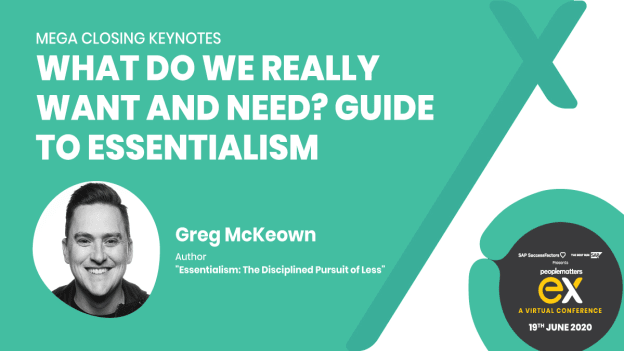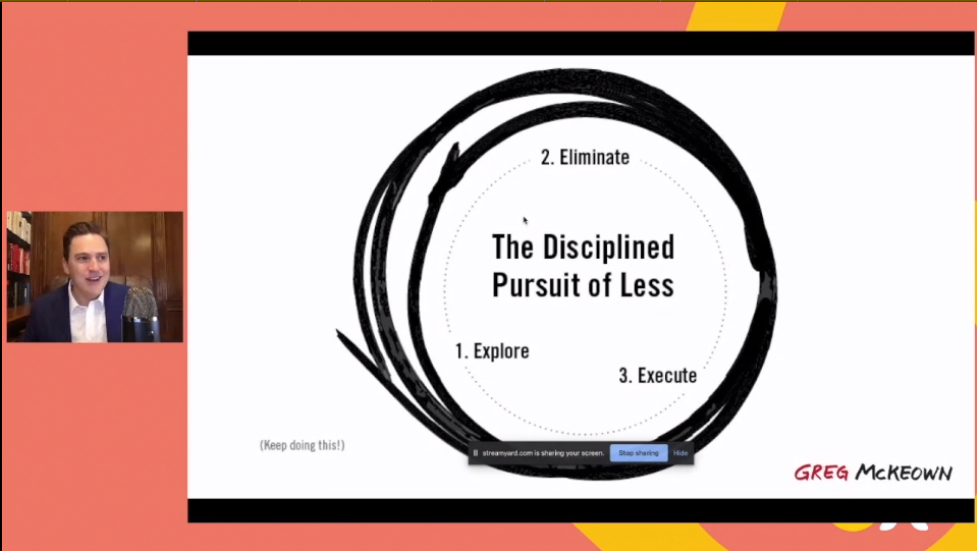Work not just in your life, but on your life

At a time when individuals across the globe scramble for little moments reminding them of the erstwhile normal, Greg McKeown, Author of the New York Times and Wall Street Journal bestseller "Essentialism: The Disciplined Pursuit of Less", spoke at People Matters Virtual EX Conference 2020 about why less is more and why it’s essential to distinguish the noise from what’s truly essential.
In the closing keynote address, Greg discusses at length about the concept of essentialism and why it matters more than ever today as humans crave for more in a restricted existence.
Capturing the current circumstances perfectly, he says this feels like we have all been sent to our rooms, to think about life and figure out what truly matters.
Life as we know it
"We are all essentialists, even if involuntarily" said Greg as he kick-started his keynote. With organizations redesigning the way work is done and leaders focused on optimizing people costs, experience often ends up being deprioritized. The question that arises then as Greg highlights is this - "How do we create an experience where we focus on what's essential, and design what really matters; instead of feeling fragmented, frustrated, stretched at work and home, and busy but not necessarily productive?” Before we create this experience though, prioritizing what matters is imperative, because we cannot get to such experience if we aren’t clear about our priorities.
Change is not new. Disruption is not new. Evolution is not new. The human species was predisposed to change a long time ago. “Change is the only constant”, rings a bell? The only element that has changed though is the speed and scale at which we have been forced to adapt and get accustomed to the continuing limitations and dynamic challenges that need to be tackled at both the professional level as well as personal front.
As we struggle and make progress to sail through these unprecedented times, it’s certain that we cannot continue with the same approach and priorities that we adopted so far. There needs to be a change. A change in behaviour, change in thinking, change in the way we work, and change in our outlook towards life. An interesting mechanism to rethink and redesign our life is the process of elimination,to filter out all the noise and preserve and nurture what truly matters to us.
“A few things are exceptionally valuable, most of the rest of it is noise," says Greg. This is where essentialism comes in. The noise above, if not eliminated, leads us to violating what’s essential for something that’s non-essential. "If you don't prioritize your life, someone else will,” notes Greg.
Becoming an essentialist
With all the chaos that has blurred the lines between personal, family and work time, people find it difficult to navigate through what’s important, what cannot be missed out on,and what can be delayed, as everything seems important.Similarly, at work, every meeting seems important, while at the same time it feels like a burden that makes us roll our eyes with the first instinct being - “Oh, there is so much I can cover in this hour if I could skip the meeting.”
It’s time to start pausing, reflecting, and thinking about value generation over hours invested. "It’s not about how many emails you respond to, it's not about how many meetings you make it to, it's about what value you create," emphasizes Greg. He insists on being selective about the work you say yes to, negotiating through non-essentials. "Negotiate through non-essential work to focus on doing fewer things but better". That will not just add greater value, but ensure that you are productive and not just busy.
As soon as you break the pattern and build the mindset of an essentialist, there are three things you would do naturally:
- You start to explore what is essential
- You will start to eliminate, deivest and reduce the non-essentials
- You will naturally start creating systems that would make it easier to do what is essential, and that is execution

"Essentialism is taking responsibility and control for the prioritization of our life," as Greg points out, adding, “We may regret many things in our life, but we won't regret the day we choose to become an essentialist."
It’s important to work not just in our life, but on our life
Growth is a crucial part of our life, and the process of elimination is critical to such growth. Eliminating here need not be a negative connotation, it really means to prioritize. If we can do that, then as Greg notes, “We become more and more of who we are, and less and less of who we aren't, as we live the essential mission of our life.”
Know yourself, know what’s most important to you, then go and spend time doing those most important things,that is what essentialism is. "It’s important to work not just in our life but on our life,” as Greg puts it.
Essentialism isn’t just a concept, but a way of life. It works not just in conversations and at work, but also plays a role in mental peace and well-being, eliminating the unnecessary noise and helping you identify what is essential to you and your well-being. As individuals all over the world endeavor to strike the right balance between work and personal time, and strive to utilize the time in hand in the most efficient and fulfilling manner, it helps to think constructively with a focus on doing things and accomplishing goals that truly matter to you.
















